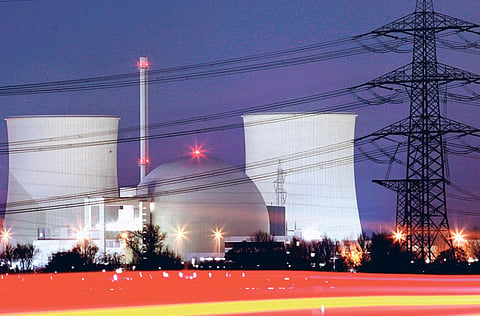Kuwait plans to build four nuclear reactors
Official says discussions are under way with international organisations bringing atomic power into an oil economy

Kuwait City: Kuwait, the fifth-biggest oil producer among Opec members, plans to build four nuclear power reactors by 2022, joining a drive for atomic energy among Gulf countries seeking alternative sources of electricity.
Kuwait's National Nuclear Energy Committee is considering options and will release a so-called roadmap for developing atomic power as early as January, Ahmad Bishara, secretary general of the body, said in an interview. The country may build four 1,000 megawatt reactors, he said.
Kuwait is in discussions with international bodies on "how nuclear energy fits in the energy mix of Kuwait for the next 20 years," Bishara said in Tokyo yesterday. "Our initial analysis indicates that nuclear is viable as long as oil is above $45 [Dh165] to $50 a barrel."
Arab countries including Saudi Arabia, the world's biggest oil exporter, and the United Arab Emirates are turning to atomic energy to save oil reserves for overseas sales. They need to allay US concerns the technology may get diverted to weapons programmes in a region that has experienced three major wars since the 1980s.
Kuwait ratified a protocol giving International Atomic Energy Agency inspectors access to future nuclear facilities to ease American concerns, said Tomoko Murakami, a nuclear analyst at the Institute of Energy Economics in Tokyo.
Summer shortages
"Kuwait's need to develop its power infrastructure is greater than other Arab countries because summer power shortages are severe," Murakami said.
Demand for electricity in Kuwait is expected to grow as much as 7 per cent annually to 25,000 megawatts by 2030, from 11,000 megawatts this year, Bishara said.
Kuwait burns 300,000 barrels a day of oil products, or 12 per cent of its daily oil production, in thermal power plants to meet demand, Bishara said. The ratio is projected to increase to as much as 20 per cent by 2025, he said.
Asia benchmark Dubai crude traded at $75.6 a barrel as of Thursday. At that price Kuwait can make about $22.7 million a day by exporting the oil it uses for power generation, according to Bloomberg calculations.
Kuwait's crude oil output was estimated at 2.3 million barrels a day in August, less than Saudi Arabia, Iran, Iraq and the UAE among Organisation of Petroleum Exporting Countries, according to data compiled by Bloomberg. The country, located between Iraq and Saudi Arabia at the northern end of the Gulf, has a population of 3.3 million people, according to government figures for 2008. It had proven oil reserves of 101.5 billion barrels in December 2009 or 7.6 per cent of the global total, according to data compiled by Bloomberg.
Memo of cooperation
Bishara was in Tokyo this week to sign a memorandum of cooperation on atomic power development with Japan, which is promoting exports of nuclear technology as part of the government's strategy for economic growth.
The agreement includes cooperation on planning and developing nuclear power and training technical experts. Kuwait has similar agreements with Russia and the US, Bishara said.
In April, Kuwait and France signed a nuclear cooperation treaty, which may allow Areva SA, the world's biggest maker of nuclear reactors, to export nuclear technology to the country.
By January, the committee will issue a plan for nuclear development that will include a timetable for bidding for contracts and potential locations of nuclear plants, Bishara said.
Reactors built by Areva, GE-Hitachi Nuclear Energy and Mitsubishi Heavy Industries Ltd. may be more attractive for Kuwait, Murakami said.
"The country will need fewer reactors and lower costs to meet its target capacity," she said. "Using their super-size reactors with about 1,700-megawatt capacity makes sense."
UAE concluded a $20 billion deal for nuclear plants with Korean Electric Power Co. in December.
Saudi Arabia, the world's largest oil supplier, said in April it will start a civilian nuclear and renewable energy centre to help meet increasing demand for power.
"Kuwait has enough sovereign funds to take up the expenses," Bishara said. "That means foreign suppliers and investors are just to be partners for technologies."
He didn't specify how much Kuwait will spend on the nuclear projects because plans aren't complete.
Members of the Organisation of the Petroleum Exporting Countries are Algeria, Angola, Ecuador, Iran, Iraq, Kuwait, Libya, Nigeria, Qatar, Saudi Arabia, the United Arab Emirates and Venezuela.
Iraq and Iran fought a war in the 1980s, which was followed by the Iraqi occupation of Kuwait in 1990 that led to an invasion by the US.
The US and other countries invaded Iraq in 2003, toppling the regime of Saddam Hussain.
Sign up for the Daily Briefing
Get the latest news and updates straight to your inbox



